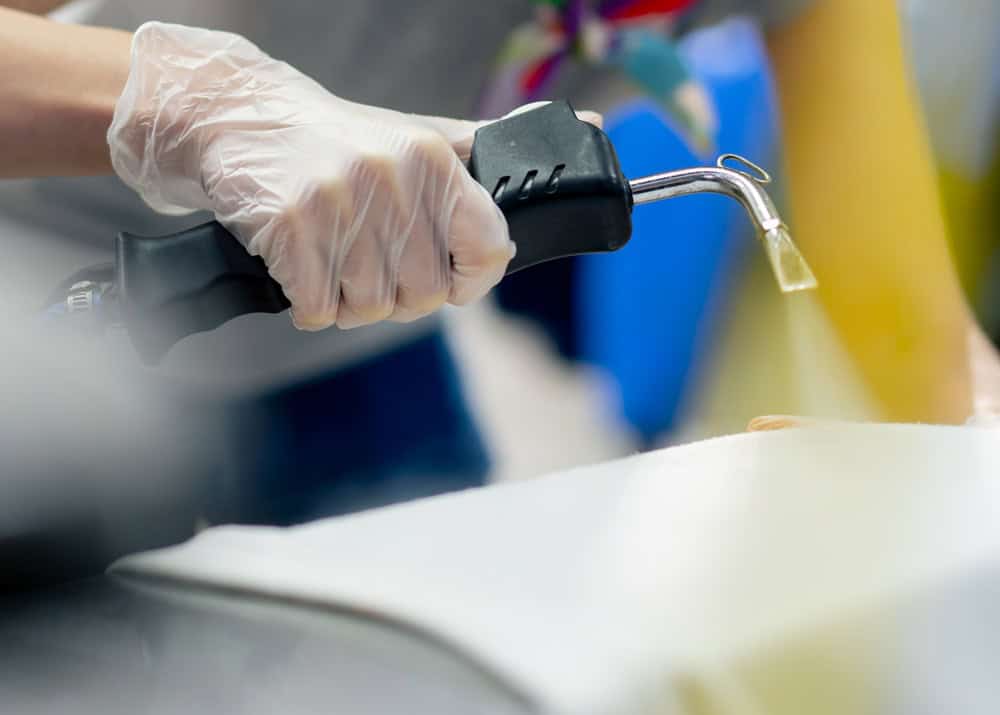
Every part of the dry cleaning process is essential, but only professional cleaners truly understand how each step works together to protect your clothes. From tagging and inspection to the final press, every phase serves a purpose: keeping fabrics safe, colors vibrant, and garments looking brand new.
But if there’s one step that’s especially underrated (yet absolutely crucial), it’s pretreatment. This stage is where professional dry cleaners identify stains, understand the fabric, and apply just the right solution to lift spots before they have a chance to set in deeper. Skip this step, and even the best environmentally friendly solvents won’t fully lift oil, wine, makeup, or ink.
Keep reading, as we walk you through what actually happens during pretreatment, how professionals do it, and what makes it so effective at keeping your wardrobe looking its best, visit after visit.
Before your clothes go through the full dry cleaning process, pretreatment is where everything starts. This step is all about targeting specific stains (i.e., grease, sweat, ink, and wine) using specialized solutions before the garment hits the machine. Without proper pretreatment, even the most advanced dry cleaning machine can only do so much.
Here’s how most professional dry cleaners perform pretreatment before moving garments to the main cleaning cycle:
Each garment is individually inspected under strong lighting. Staff look for obvious stains, hidden marks (like underarms or hemlines), and specific wear points like cuffs, collars, and elbows. Notes may be taken, especially for high-value items like leather jackets, formal gowns, or customer-flagged problem areas.
Stains are classified based on their source:
Knowing the stain type helps determine the proper chemical approach, because not all stain removers are universal.
Cleaners choose spotting agents specific to the stain type and fabric. Some solutions break down oils; others oxidize tannins or neutralize dyes. On delicate fabrics like silk, linen, or cashmere, gentler formulations are used to avoid fiber damage.
Depending on the garment and stain, a technician might gently tamp (blotting with a spotting brush), scrape residue, or apply controlled steam. This helps the chemical agent penetrate or lift the stain before cleaning.
In some cases, the stain remover needs to be neutralized to prevent chemical reactions in the main cleaning cycle. Garments may be lightly rinsed or dried before proceeding.
After pretreatment, the garment is tagged for the correct cleaning method (i.e., dry cleaning or wet cleaning). Items with multiple fabric types or embellishments may be routed to special care cycles or finished by hand.
Once cleaned, garments are inspected again. If the stain persists, a secondary spotting round may take place, though that’s usually rare when pretreatment is performed correctly the first time.
In short, pretreatment is a trained process that improves cleaning results and protects your clothes from damage.
If you work with a dry cleaner you haven’t used before, ask if they include pretreatment in their base service. Not all dry cleaners offer this level of attention, and it's often what separates average service from top-tier care.

Stains don’t just disappear during dry cleaning, especially if they’ve had time to soak in. Without pretreatment, many spots will survive the cycle, or worse, get baked in by the heat and solvents used. That’s why pretreating stains is crucial for restoring garments to a presentable, wearable state. It’s also a sign that your cleaner takes their job seriously and values the condition of your clothes.
Once stains are exposed to heat or solvents without prior treatment, they often become chemically bonded to the fibers. This is especially true for deodorant, body oils, or wine spills. Pretreatment breaks this cycle by neutralizing the stain before the cleaning phase begins.
A stain left untreated may lead to overwashing or repeated exposure to harsh chemicals in an attempt to remove it later. Pretreatment gets ahead of the problem, using gentler methods up front so there’s less need for repeat exposure that could degrade the garment over time.
Some materials, such as silk, wool, suede, and velvet, react poorly to bulk treatment. With pretreatment, cleaners can isolate and treat specific stains without having to fully soak or scrub the garment. This keeps intact delicate threads and preserves textures that could otherwise be ruined.
Pretreated clothes look noticeably cleaner, crisper, and more evenly finished than those that aren’t. Whether it’s a business suit, a wedding dress, or a dress shirt, garments that undergo pretreatment consistently come out looking fresher and more refined.
Even if you use a same-day dry cleaning service, pretreatment speeds up the outcome by eliminating the need for second-round cleaning. A one-and-done result means your cleaner doesn't need to re-run the garment through extra cycles, and you get a better turnaround with fewer delays.
Stains (especially oily) can bleed during cleaning, spreading into new areas or transferring to other garments. Pretreatment contains the problem, keeping the stain isolated and fully removed before the garment enters the group cleaning stage.
Each stain has a “best fit” chemical or enzyme to break it down. Pretreatment ensures the cleaner has control over this process instead of relying on whatever solvents are present in the machine wash. This precision leads to better results with fewer risks.
Dry cleaners who invest time in pretreatment typically deliver better customer service over all. They take time to inspect your clothing, ask questions, and make expert decisions that protect your investment. This extra attention adds real value to your laundry experience.
Untreated stains can dull fabric color or cause uneven cleaning results. Pretreatment helps preserve the original appearance by evenly lifting discoloration before the full wash, especially in garments with whites, pastels, or intricate prints.
Enjoy premium care for both your everyday essentials and high-end pieces, only from Rochester’s most trusted dry cleaning specialists: Julian’s Dry Cleaners. Our dry cleaning process pairs cutting-edge technology with meticulous hand inspection: every garment is pretreated for stains, cleaned with fabric-specific solutions, and finished by seasoned pressers who know a perfectly crisp collar from a mile away.
Add our free Pickup and Delivery Service five times a week, and spotless clothes are as effortless as a click or call. Visit any of our convenient Julian's Dry Cleaners locations or sign up on our website to schedule a pickup.
Interested in our other professional services? We also offer Wash and Fold Laundry, Premium Shirt Laundry, Tailoring and Alterations, Leather and Suede Cleaning, and Household Items Cleaning Services.